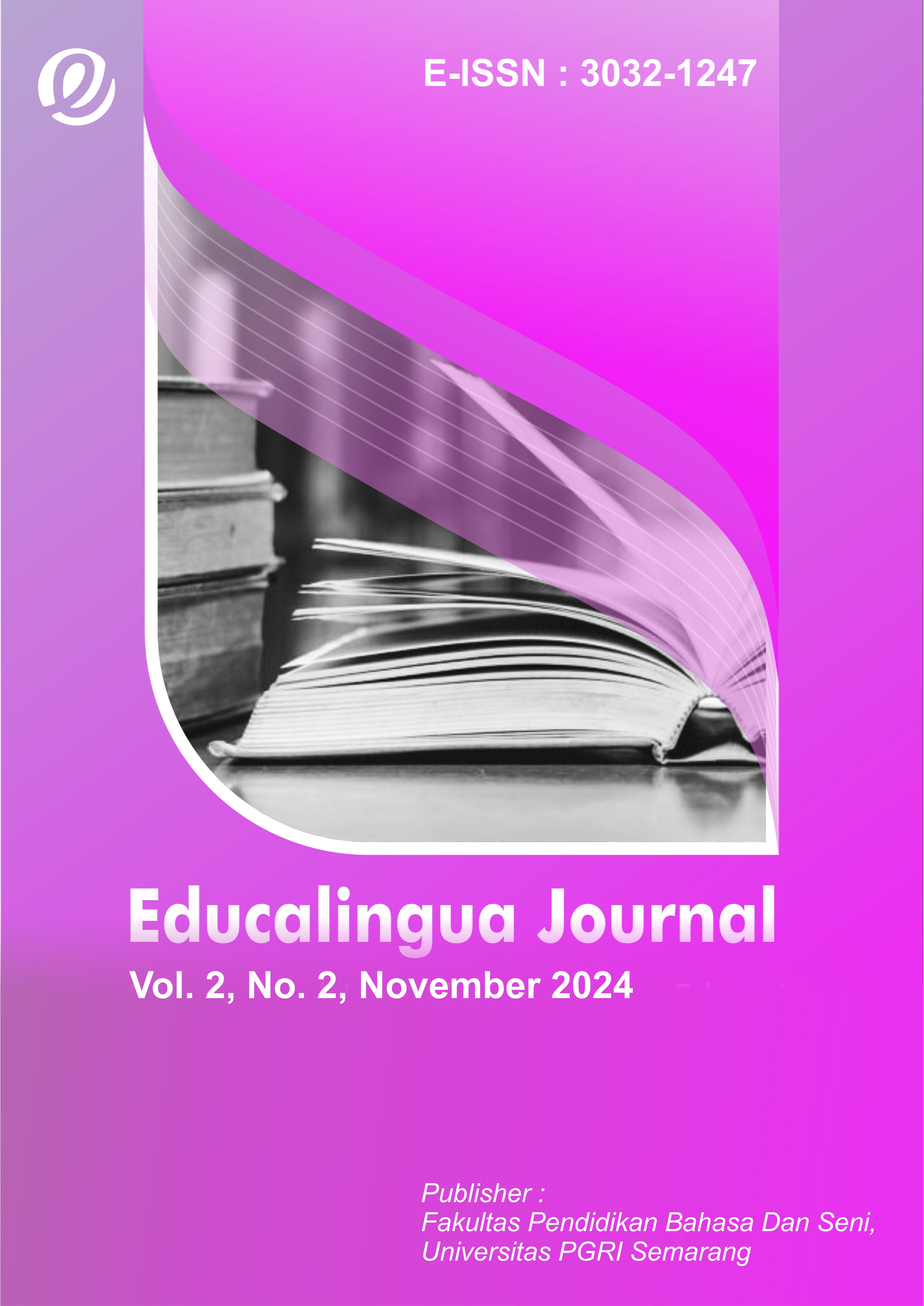Discourse Analysis: Language Issues in Indigenous Language Learning in Indonesia
DOI:
https://doi.org/10.26877/educalingua.v2i2.1114Keywords:
Indigenous Languages, language learning, Indonesia language policy, linguistic diversityAbstract
This article examines the complexities of language issues in the context of Indigenous language learning in Indonesia, a nation with over 700 living languages. Indigenous languages are at risk of extinction due to socio-political and economic factors. The research examines the role of language policies, educational practices, and community engagement in preserving and revitalizing Indigenous languages. It highlights the challenges Indigenous communities face in accessing quality language learning resources and the impact of globalization on language transmission. The discourse surrounding Indigenous language learning in Indonesia reveals the importance of these languages in cultural identity and heritage. In Indonesia, many Indigenous languages are classified as endangered, and there is an urgent need to address the barriers to effective language learning. The Indonesian government's language policy has historically prioritized the national language, Bahasa Indonesia, often marginalizing Indigenous languages. This policy environment creates significant challenges for Indigenous language learners, who may find themselves without adequate resources or support. Schools in many regions do not offer Indigenous language programs; when they do, the curriculum often lacks cultural relevance. Discourse analysis reveals that Indigenous communities often possess rich linguistic resources and knowledge that can contribute to language teaching. Collaborative efforts between educators, community leaders, and linguists can create a more inclusive language learning environment. Initiatives such as language nests, immersion programs, and local storytelling can enhance the learning experience by making it culturally relevant and engaging. By fostering a discourse that values and promotes linguistic diversity, Indonesia can work towards preserving and revitalizing Indigenous languages.
References
Abduh, A., & Rosmaladewi, R. (2019). Language policy, identity, and bilingual education in Indonesia: A historical overview. XLinguae, 12(1), 219–227. https://doi.org/10.18355/XL.2019.12.01.17
Allen, W., Hyde, M., Whannel, R., & O’Neill, M. (2018). Teacher reform in Indonesia: can offshore programs create lasting pedagogical shift? Asia-Pacific Journal of Teacher Education, 46(1), 22–37. https://doi.org/10.1080/1359866X.2017.1355051
Baker, L. (2019). Community-Based Service-Learning in Language Education: A Review of the Literature. In International Journal of Research on Service-Learning and Community Engagement (Vol. 7, Issue 1). https://ijrslce.scholasticahq.com/
Boyle, A., August, D., Tabaku, L., Cole, S., & Simpson-Baird, A. (2015). Dual Language Education Programs: Current State Policies and Practices. Office of English Language Acquisition, US Department of Education.
Chaika, O., Sharmanova, N., & Makaruk, O. (2024). Revitalising Endangered Languages: Challenges, Successes, and Cultural Implications. Futurity of Social Sciences, 2(2), 38-61.
Chiswick, B. R., & Miller, P. W. (2014). International Migration and the Economics of Language.
Cohn, A. C., & Ravindranath, M. (2014). Local Languages in Indonesia: Language Maintenance or Language Shift? In Linguistik Indonesia Agustus: Vol. ke (Issue 2).
Costa, J. (2017). Revitalising Language in Provence: A Critical Approach. https://www.researchgate.net/publication/333078163
Da Silva, C., Pereira, F., & Amorim, J. P. (2023). The integration of indigenous knowledge in school: a systematic review. Compare. https://doi.org/10.1080/03057925.2023.2184200
Demmert, W. G. (2011). What is Culture-Based Education? Understanding Pedagogy and Curriculum.
Dharmaputra, G. A. (2018). Language Policy, Ideology and Language Attitudes: A Study of Indonesian Parents and their Choice of Language in the Home.
Disbray, S. (2016). Spaces for learning: policy and practice for indigenous languages in a remote context. Language and Education, 30(4), 317–336. https://doi.org/10.1080/09500782.2015.1114629
Farfán, J. A. F., & Cru, J. (2021). Reviewing experiences in language (re)vitalisation: recent undertakings in the media and the arts. Journal of Multilingual and Multicultural Development, 42(10), 941–954. https://doi.org/10.1080/01434632.2020.1827644
Fitriati, S. W., & Rata, E. (2020). Language, Globalisation, and National Identity : A Study of English-Medium Policy and Practice in Indonesia. Journal of Language, Identity and Education, 1–14. https://doi.org/10.1080/15348458.2020.1777865
Fong, C. J., Owens, S. L., Segovia, J., Hoff, M. A., & Alejandro, A. J. (2021). Indigenous Cultural Development and Academic Achievement of Tribal Community College Students: Mediating Roles of Sense of Belonging and Support for Student Success. Journal of Diversity in Higher Education, 16(6), 709–722. https://doi.org/10.1037/dhe0000370
House, J. P. (2023). A Right to Protect Indigenous Languages: A Threat Against Extinction.
Hugo, W. (2020). The Codification of Native Papuan Languages in the West Papua Province: Identification and Classification of Native Papuan Languages. Journal of Arts and Humanities. https://doi.org/10.18533/jah.v9i10.1990
Huszka, B., Stark, A., & Aini, I. (2024). Linguistic Sustainability: Challenges and Strategies of Preserving Minority and Indigenous Languages-The Case of Indonesia.
Jafari, Z. (2023). The Role of AI in Supporting Indigenous Languages. AI and Tech in Behavioral and Social Sciences, 1(2), 4–11. https://doi.org/10.61838/kman.aitech.1.2.2
Kessler, G. (2018). Technology and the future of language teaching. Foreign Language Annals, 51(1), 205–218. https://doi.org/10.1111/flan.12318
Kowaluk, O. (2016). Creating Culturally Responsive Classrooms.
Lie, A. (2017). English and Identity In Multicultural Contexts: Issues, Challenges, and Opportunities. Teflin Journal - A Publication on the Teaching and Learning of English, 28(1), 71. https://doi.org/10.15639/teflinjournal.v28i1/71-92
Lo Bianco, J. (2010). The importance of language policies and multilingualism for cultural diversity.
Maplethorpe, L. (2023). Growing Our Roots: Exploring the Home Language and Literacy Environment within the Context of Indigenous Ways of Knowing and Being.
McCarty, T. L. (2021). The holistic benefits of education for Indigenous language revitalisation and reclamation (ELR2). Journal of Multilingual and Multicultural Development, 42(10), 927–940. https://doi.org/10.1080/01434632.2020.1827647
McCarty, T. L., & Nicholas, S. E. (2014). Reclaiming Indigenous Languages: A Reconsideration of the Roles and Responsibilities of Schools. Review of Research in Education, 38(1), 106–136. https://doi.org/10.3102/0091732X13507894
Mitchell, G., Chojimah, N., & Nurhayani, I. (2022). Directions for Indonesian Language Policy in Education: Towards A Translingual Perspective. NOBEL: Journal of Literature and Language Teaching, 13(2), 271–292. https://doi.org/10.15642/nobel.2022.13.2.271-292
Mora, R. A., Chiquito, T., & Zapata, J. D. (2019). Bilingual Education Policies in Colombia: Seeking Relevant and Sustainable Frameworks for Meaningful Minority Inclusion. In Bilingualism and Bilingual Education: Politics, Policies and Practices in a Globalized Society (pp. 55–77). Springer International Publishing. https://doi.org/10.1007/978-3-030-05496-0_4
Moseley, Christopher. (2012). The UNESCO atlas of the world’s languages in danger : context and process. World Oral Literature Project.
Oh, E., & Reeves, T. C. (2014). Generational Differences and the Integration of Technology in Learning, Instruction and Performance.
Olateju Temitope Akintayo, Fadeke Adeola Atobatele, & Patricia Diane Mouboua. (2024). The dynamics of language shifts in migrant communities: Implications for social integration and cultural preservation. International Journal of Applied Research in Social Sciences, 6(5), 844–860. https://doi.org/10.51594/ijarss.v6i5.1106
Olthuis, M.-Liisa., Kivelä, Suvi., & Skutnabb-Kangas, Tove. (2013). Revitalising Indigenous Languages : How to Recreate a Lost Generation. MULTILINGUAL MATTERS.
Perry, C. R. (2024). Telling Stories to Improve Indigenous Language Education: How the Integration of Indigenous Storytelling Can Support Indigenized Indigenous Language Curriculum in Canada.
Quiñonez, J. (2020). Linguistic Identity Construction and Cultural Inclusivity. Master Thesis, School of Education and Leadership Student Capstone Projects, Hamline University
Raskauskas, J., Behrends, A., & Nuñez, I. (2015). The Bilingual Advantage: Promoting Academic Development, Biliteracy, and Native Language in the Classroom , by Diane Rodríguez, Angela Carrasquillo, and Kyung Soon Lee . Bilingual Research Journal, 38(3), 357–360. https://doi.org/10.1080/15235882.2015.1093040
Reyhner, J. (2010). Indigenous Language Immersion Schools for Strong Indigenous Identities. Heritage Language Journal, 7(2), 299–313. https://doi.org/10.46538/hlj.7.2.7
Saad, G. M. (2020). Variation and change in Abui : the impact of Alor Malay on an indigenous language of Indonesia. http://hdl.handle.net/1887/136911
Sakti, S. A., Endraswara, S., & Rohman, A. (2024). Revitalizing local wisdom within character education through ethnopedagogy apporach: A case study on a preschool in Yogyakarta. Heliyon, 10(10). https://doi.org/10.1016/j.heliyon.2024.e31370
Septiyana, I. (2018). Glocalization of Intangible Cultural Heritage: Strengthening Preservation of Indonesia’s Endangered Languages in Globalized World. http://www.liputan6.com/lifestyle/read/2855842/badan-bahasa-13-
Shadiev, R., & Yang, M. (2020). Review of studies on technology-enhanced language learning and teaching. In Sustainability (Switzerland) (Vol. 12, Issue 2). MDPI. https://doi.org/10.3390/su12020524
Silburn, S. R. . (2011). Early years English language acquisition and instructional approaches for Aboriginal students with home languages other than English : a systematic review of the Australian and international literature. Menzies School of Health Research.
Siregar, I., & Yahaya, S. R. (2023). Model and Approaches to Preserving Betawi Language as an Endangered Language. Eurasian Journal of Applied Linguistics, 9(1), 274–282. https://doi.org/10.32601/ejal.901023
Solikhah, I., & Budiharso, T. (2020). Exploring Cultural Inclusion in the Curriculum and Practices for Teaching Bahasa Indonesia to Speakers of Other Languages. In www.jsser.org Journal of Social Studies Education Research SosyalBilgilerEğitimiAraştırmalarıDergisi (Vol. 2020, Issue 3). www.jsser.org
Sparrow, R., Dartanto, T., & Hartwig, R. (2020). Indonesia Under the New Normal: Challenges and the Way Ahead. Bulletin of Indonesian Economic Studies, 56(3), 269–299. https://doi.org/10.1080/00074918.2020.1854079
Toombs, E., Kowatch, K. R., & Mushquash, C. J. (2016). International Journal of Child and Adolescent Resilience Resilience in Canadian Indigenous Youth: A Scoping Review.
Trager, B. (2021). Hybridized Internships and Service-learning: an Inquiry into Hybridized Internships and Service-learning: an Inquiry into Student, Community, and Higher Education Partner Experiences in Student, Community, and Higher Education Partner Experiences in a Community-based Internship Program a Community-based Internship Program. https://dc.uwm.edu/etd/2843
Trinick, T., & Heaton, S. (2021). Curriculum for minority Indigenous communities: social justice challenges. Language, Culture and Curriculum, 34(3), 273–287. https://doi.org/10.1080/07908318.2020.1831009
Tulloch, S., Kusugak, A., Chenier, C., Pilakapsi, Q., Uluqsi, G., & Walton, F. (2017). Transformational bilingual learning: Re-engaging marginalized learners through language, culture, community, and identity. Canadian Modern Language Review, 73(4), 438–462. https://doi.org/10.3138/cmlr.4052
Ward, C. J., & Braudt, D. B. (2015). Sustaining indigenous identity through language development: Comparing indigenous language instruction in two contexts. In Indigenous Education: Language, Culture and Identity (pp. 139–170). Springer Netherlands. https://doi.org/10.1007/978-94-017-9355-1_8
Watanabe, Y. (2018). Handbook of cultural security. In Handbook of Cultural Security. Edward Elgar Publishing Ltd. https://doi.org/10.4337/9781786437747
Wexler, L. (2014). Looking across three generations of Alaska Natives to explore how culture fosters indigenous resilience. Transcultural Psychiatry, 51(1), 73–92. https://doi.org/10.1177/1363461513497417
Wiltshire, B., Bird, S., & Hardwick, R. (2022). Understanding how language revitalisation works: a realist synthesis. Journal of Multilingual and Multicultural Development. https://doi.org/10.1080/01434632.2022.2134877
Zein, S., Sukyadi, D., Hamied, F. A., & Lengkanawati, N. S. (2020). English language education in Indonesia: A review of research (2011-2019). In Language Teaching (Vol. 53, Issue 4, pp. 491–523). Cambridge University Press. https://doi.org/10.1017/S0261444820000208








